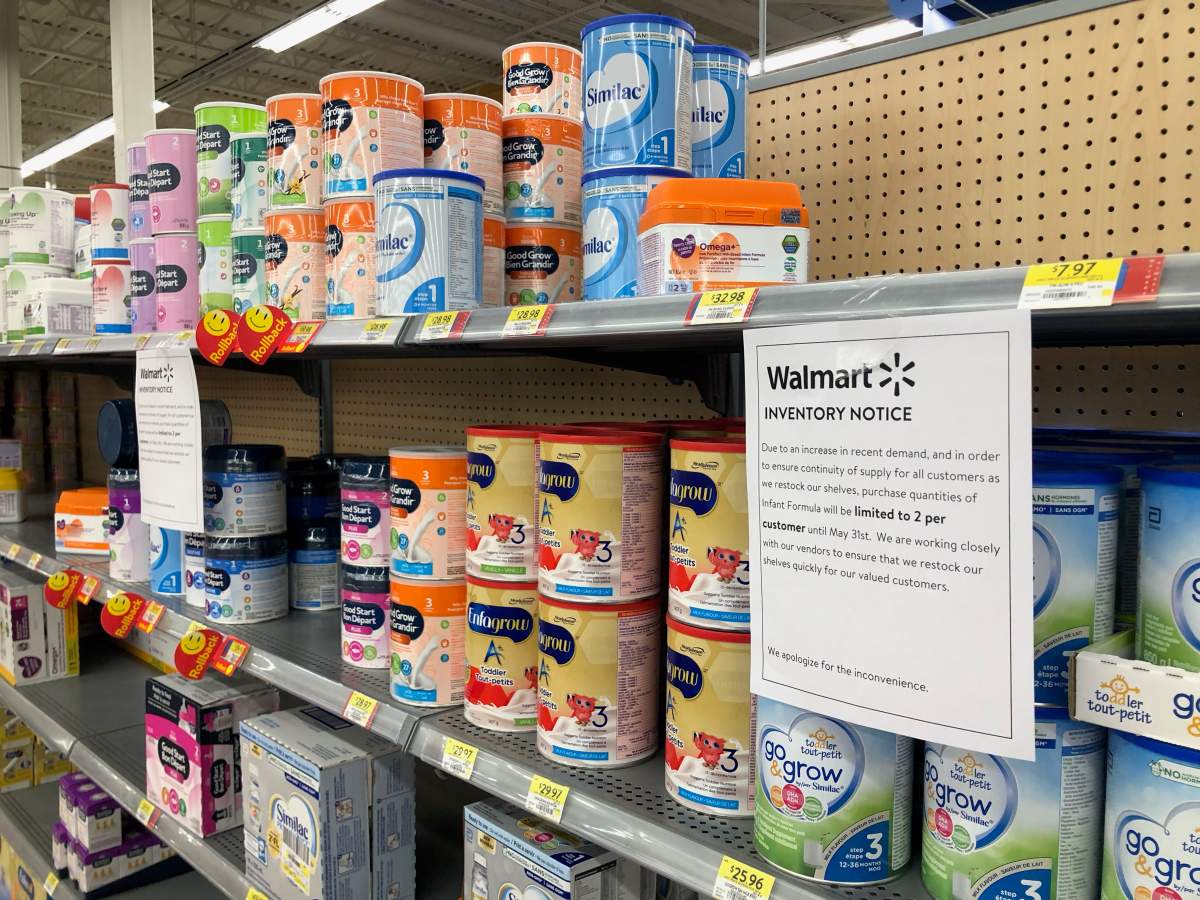Some store shelves are bare and purchase limits are in place for baby formula at many major retailers in Halifax.

It’s a situation Krista Dunn, the housing manager with the YWCA, said is being felt by the organization’s clients.
“It’s super concerning and they’ve definitely been talking about it a lot,” she said of clients in the YWCA’s supportive housing program for young mothers.
The program offers housing and support to young moms between the ages of 16 and 24 — women Dunn said are on a low, fixed income.
“We have a couple moms whose children are on specialized formula, so that’s even more worrisome, because they need something really specific for the dietary needs of their children,” she told Global News.
“We’ve had a couple instances where we’ve had to travel to a couple different stores — two or three different stores — to find formula, so it’s definitely concerning.”
The temporary closure of a large Abbott Laboratories manufacturing plant in Michigan is what triggered the shortage of formula, specifically ones designed for infants with food allergies and some medical conditions.
Canada is faring better than the United States. However, experts say it’s led to panic buying of all types of formula here in Canada, despite a fairly good flow into the region.
“Our retailers, they continue to report through to us that the majority of the baby formula sections for regular baby formula within their stores is stocked and that any shortages that they’ve had have been temporary in nature,” said Retail Council of Canada Atlantic Director Jim Cormier.

Get weekly health news
“The primary concern continues to be with specialized baby formulas, including hypoallergenic products. These products are badly needed all across North America.”
Many retailers have taken it upon themselves to put purchase limits in place, however Cormier said regardless, people should only buy what they need to ensure every family has access to the product they desperately need.
“As that problem with the supply chain is being regulated, it’s still going to take time, so we encourage consumers to avoid panic buying,” said Cormier.
Health Canada working to mitigate impacts
In an email, a spokesperson for Health Canada said it is aware of the current global supply constraints on baby formula and its working to mitigate possible impacts here in Canada.
“Health Canada adopted an interim policy to recommend that the CFIA temporarily exercise enforcement discretion with respect to certain labelling and composition requirements on the importation and sale of products listed in Appendix A, but are manufactured to comparable standards, to prevent and mitigate shortages, while ensuring a safe supply of these products to the vulnerable Canadians that rely on them,” they said.
“Health Canada wants to assure everyone that all products imported to mitigate the shortage and for which CFIA will apply discretionary enforcement are safe. These are from countries that have regulatory and manufacturing standards that are similar to those in Canada. Furthermore, Health Canada has conducted a safety assessment of each product prior to addition to the list.”

Prime Minister Justin Trudeau addressed the issue earlier this week. He said the supply of regular baby formula should be fine, but acknowledged there could be challenges around specialized formulas.
“We know that families are worried about their newborns and we’re going to be there to make sure we’re doing everything we can to help them,” he said.
Sylvain Charlebois, a Dalhousie University professor and director of the Agri-Food Analytics Lab, said the big question now is when the plant in Michigan will be back up and running.
“If that plant opens up again in a couple of weeks, we should be out in the clear within the next four to six weeks as a country,” said Charlebois.
“Of course, I suspect that Abbott will prioritize the American market first.”
The tenuous timeline is putting some Nova Scotians in difficult situations, said Dunn.
“Supporting single young moms, they’re already dealing with a lot trying to parent and achieve all their other goals, so major things like a shortage in formula — which is a very basic need to be able to feed your baby — so hearing about that and having to worry about that causes a lot of extra stress, for sure,” she said.









Comments
Want to discuss? Please read our Commenting Policy first.